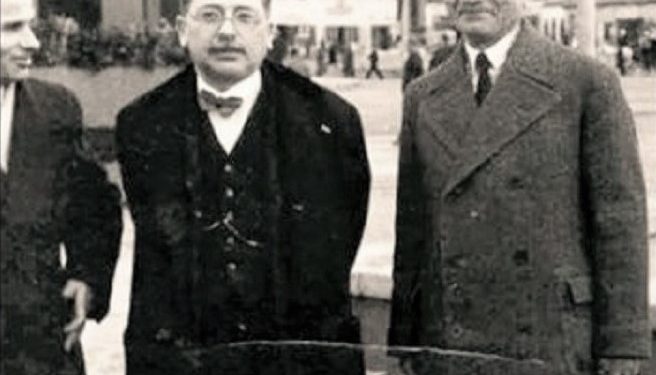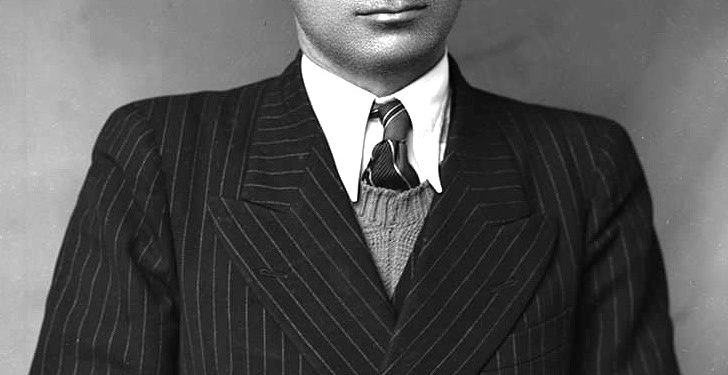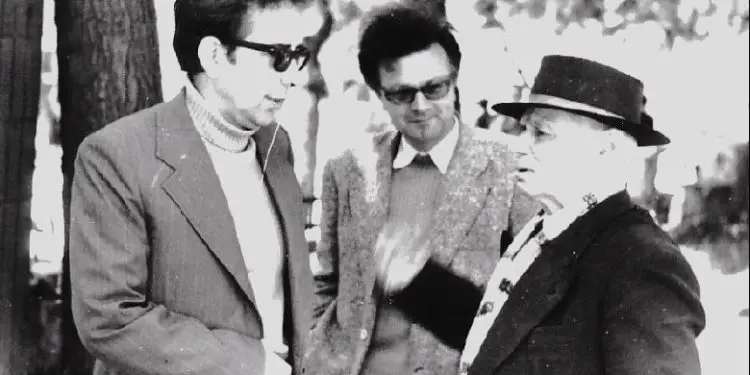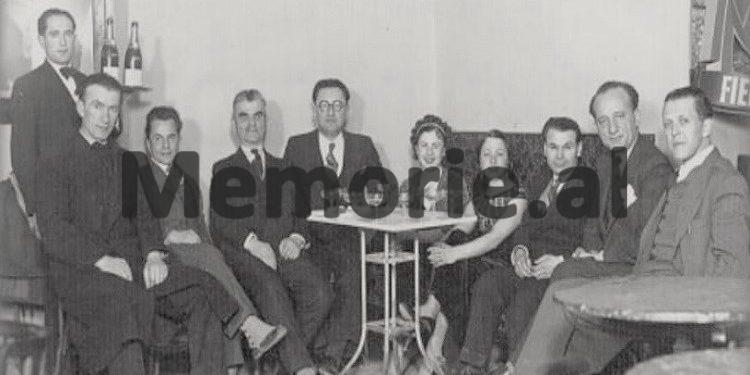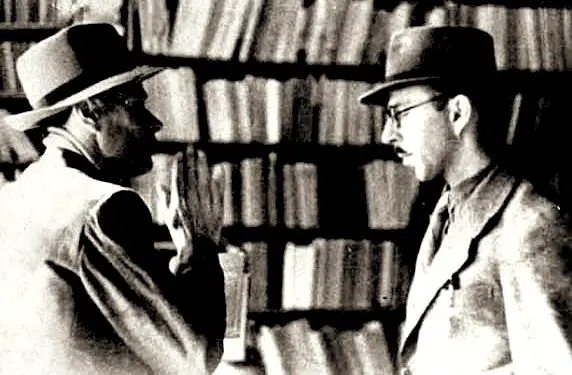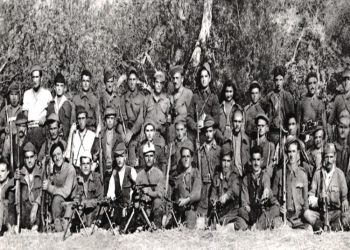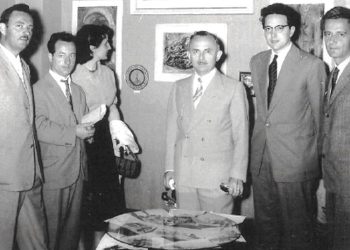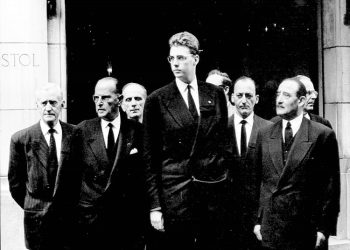By Agim Janina
Memorie.al / The great poet Lasgush Poradeci, wrote thousands of verses. But few appreciated him. It didn’t matter much, he wrote and wrote. Maybe only for himself. What he felt he threw on a few pieces of paper; he was inspired by everything, but above all by nature. In May 1984, the great poet openly expressed what he felt, what was eroding him from the inside. Closed within the four walls of his apartment and in the small courtyard of the one-story house, Lasgush Poradeci postponed the last days of his life. In the memory of the great poet, there were also great worries, but above all of his work, for the verses he wrote. Agim Janina in 1984 was able to get an interview with him, where Poradeci burst out his anger for what he had gone through. But the thoughts about the art of the distinguished poet remained for a long time ‘archived’ in the drawer.
The great poet spoke out against the censorship that was imposed on art, but he never told the people in power of that time, as he was convinced that he would end up in prison. He could not express himself freely and for this he was sure. “You are afraid to say a word, because they spy on you”, – Lasgushi expressed. Culture for him had come to an end, and art was also under complete surveillance.
Artists were afraid to express themselves freely both in writing and in painting, sculpture and other great works. When he was young, he met Fan Noli and until he closed his eyes forever, he appreciated him as a great poet. While he recited the verses of Gjergj Fishta with feeling and desire. He had known both of them closely. For several months, he devoted himself to the profession of drawing teacher at the Tirana Gymnasium. He had been Odhise Paskal’s teacher, as well as Ramiz Alia’s. He had even scolded Alia in class, after he thought he was the cause of the noise created and had started to cry.
But now things had changed. At the time when Poradeci was composing verses and felt powerless to publish them, Ramiz Alia was dealing with issues of propaganda, art and culture. What was the situation of the distinguished poet? How had he been locked up in his apartment and why was he being forgotten? How did Poradeci live on the verge of misery? Why did he think that art and culture were on the verge of collapse? How was his activity as a poet and writer monitored? Why did he not trust the senior leaders of art and culture? How had he come to know great writers, such as Fan Noli and Gjergj Fishta? All these riddles were revealed to Poradeci in May 1984, when he was already in his 80s.
Agim Janina’s testimony about the meeting with Lasgushi
One morning in May 1984, not knowing who to turn to for the poet’s whereabouts, I set off for the Address Office. “There is no address with such a surname. Poradeci is a city surname and we don’t have it in our records,” the clerk replied, pursed her lips and placed her hands on the records. Look for Llazar Gusho. “That’s right”! After a few moments, she handed me the poet’s address, written on a slip of paper. “The house is located on the street behind the ‘Arbana’ hotel, on the city ring road. It hasn’t been painted for a long time. The entrance runs parallel to the street. A simple, one-story house without a fence, with an equally small courtyard all around, planted with various trees.” This was the description they gave me of the location of Poradec.
As soon as I entered the house, I had my first contact with the great poet. Lasgushi had a portrait that left a mark, which was later impossible to forget. On his head was a black fur hood, slightly frayed from long use. The hair on his beard had completely turned white, sparse, and long because they had not been removed for a long time. His small black eyes shone and his whole face was like a lunar pallor, but his lively eyes seemed to burn from within. The short body, heavily weighed down by the weight of years, was dressed in a black sailor jacket, fastened at the waist by a wide officer’s belt with two large pins.
A cotton scarf was wrapped around his thin neck and instead of trousers, he was wearing pajamas. On his feet he wore a pair of woolen slippers. Both the slippers and the pajamas were patched. Lasgushi seemed to show a certain inconsistency with the times. He expressed this everywhere: in his clothes, in his conversation, in his posture, in his gaze. He clutched a rubber band in his hand and a thin professor was tied to it. He was pulling the long-haired dog with it, which hung down to the ground. It was a revolt against the times in which he lived. I had not prepared what to call him, but since I had gone to ask him about the drawing school, I asked him:
How are you, professor?
“Good”!
“Pascal sent me to you,” I began to speak. “We agreed on the Drawing School.”
“So, you met with Pascal?! Huh…”- he gave me another quick, fixed look, furrowing his drooping eyebrows slightly and said: “I have a friend, Pascal. A great sculptor. He has made many beautiful monuments.”
How are things going for you?
“Things go well when you do them well”!
Has the weather bothered you a bit?
“Tirana has a bad climate in the summer. I can’t stand it. I’m out of breath. I’m used to the climate of Pogradec, with the clean air, with the lake.”
Can you tell me something about the drawing school?
“You are asking me from afar. Things are also forgotten. But I remember that I taught at the Tirana Gymnasium and I completed classes at Paskal’s school. Well, I taught at that school. I remember that I taught the subject of drawing. I chose drawing, because with it I was free to do my own thing. The students were young, so they were very polite and respected us a lot. In my time, we all had great respect for the teacher. We respected him. Whereas now they don’t respect you at all.”
What do you think about art?
“Today you can’t make art. Art is mixed with politics. We are still in a revolution. You are afraid to say a word, because they will spy on you. I was a professor with two degrees. I had studied in Austria and people respected me, but the World War is to blame. It devalued things. Wait until a new world war breaks out. Millions of people were killed in the World War, do you hear? Millions of souls!
Not only here, but in France, Germany, Italy, it is the same. Art has become politics. Ministers fell and those who did not know became ministers. Art is not allowed to be free today. Speak if you want! May the angel of death be upon your head! Not that I will speak badly of Enver, but of works of art, if you speak badly, they will suppress you. The war is to blame. Today everyone has become the same. The same as the teacher and the professor. There is no respect.”
Why don’t you publish your writings in magazines, newspapers, or write books?
“Art is made by individuals, artists. I want to write about how a portrait is made, how a nose, mouth, lips is made, but who will publish it?! Newspapers, magazines are in the hands of people who don’t understand art. In my time, the government didn’t interfere in our affairs. The artist lived independently, did whatever he wanted. Art was detached from politics. Artists were idealists. They had ideals. Whereas today, there are no ideals! No one appreciates art.”
Why do you think there are no artists today?
“They won’t let you go! Because if you went to the minister for art work, no one would wait for you, and if they did, the person waiting for you would be the one who doesn’t know anything about art. Why did this guy come?!” he says to himself and doesn’t appreciate you at all. Strangely, they’ve even built a culture house. I don’t know why they call it a culture house, when there’s no culture there. Today, art has become politics, it’s controlled. The artist doesn’t need politics. He should create on his own, detached from society, away from politics, lock himself in his room, even lock the door with seven pairs of keys and if the balls fall, not open it, but continue writing poetry.
Don’t expect visits, because art is more important than visits. The artist works with his mind, with his brain, not with his hands. Art requires real artists. He wants people who are upstanding and cultured. I write poems. They are not done immediately, they take time. I haven’t written much, but what I have written I have held in my hands for a long time before publishing. With one poem, I lasted eight years without publishing it. At that time, Paskali was making a work of art, a statue, and he would go and say that we will put it here and no one would say anything back.
At that time, the Municipality of Korça proposed to Paskali that he make the city’s guardian angel. And he would do that, but someone present, a member of the municipality, said; let’s let the sculptor do what he wants. Paskali made us the “National Fighter”. Very good work. The municipality did not interfere in the works of art, without having that valuable work of Paskali. Art should be separated from politics. Works of art do not make ministers or prime ministers, but great artists do”!
Have you known Noli up close?
“Noli was very great. A poet. He came to Poradec and I, who was little at the time, became attached to him, because I knew him and had read some of his poems. Until then, I had written poems, but I had not yet published them. Noli was a very great man, a man who helped artists, helped talents, where they were, or where they showed any inclination. He encouraged those who wanted to write, who would give them a scholarship, the ministers?! They were ignorant! Later, I got to know Noli better. He was a poet, but also a great man. I had correspondence with him. He was very loving and simple. He did not hold his head high. He helped everyone”.
Have you known Andrea Kushi?
“I also knew Andrea Kushi. He was a teacher. I was a professor. Andrea was a simple teacher. He taught drawing. I got into poetry, I am a lyric poet. Fishta is epic”.
Have you known Gjergj Fishta closely?
“Yes! Fishta is a great and powerful poet. But how do these people understand him. Fishta was a man of great culture. Today they have left him aside; they do not study him in schools. Listen to what Fishta writes.
Oh, you bastard, Nikollë, May God kill you!
You have never seen an Albanian with your own eyes
They call me Oso the gunpowder
who burns himself with all of you”!
How do you remember Fishta’s verses so well?
“A good poet, not only remembers all of his poems, but also the poems he has read and liked. With the money I earned from the first publication of his poems, I bought the house where we are meeting today. In my time, art was highly valued. Today he…”!
Have you participated in the “Friends of Art” society?
“I am against societies. I do not want to participate in any society. I have never accepted, you hear, never to participate in societies, because art should remain art. I am a poet. I want to work in my house, to write verses. I have never participated in any society! I am against them. They have come and told me to join one of them, but I have never accepted. Paskali did. He participated in societies. He founded a drawing school. Paskali is great.
He went to the Minister of Education, Marash Ivanaj, and told him to open a drawing school. Marash Ivanaj was a man of culture. He accepted anyone to talk to him, while Paskali accepted him because he was a personality, so he listened to him. I taught at the Tirana Gymnasium. I taught drawing. I am not the one to teach. I do not want to. That is my nature. I would have them draw an ear of grapes on a plate, or an apple pear, while I myself sat at the teacher’s desk and wrote poems. That’s how I wrote poems”.
Do you remember any events that have stuck in your mind during your time as an art teacher?
“I remember a lesson, where as I was writing, I heard noise in the classroom and my eyes fell on a child. I approached him and with a reprimanding and punishing voice, I said to him; ‘Get out’! The student got up and started crying. I felt sorry, realizing that he was not to blame and I went to him. The student was Ramiz Alia. Ramiz started crying. He had not made a sound. I felt sorry. I wiped his tears with a handkerchief, stroked his head, calming him down. Then I sat him down on the bench. In the afternoons we would gather in cafes and discuss a lot about art. We did not gossip.
But art requires sacrifice, you have to be broad in spirit, have poetry inside, cherish the rhyme, not for a day, not for a month, not for a year. Just like Nositi. I have enjoyed painting. I have many portraits of friends, like Mitrush Kutel, whom I had a close friend and colleague. He was also from Poradeci. I painted Aleks Çaçi, Naim Frashëri, Zef Skiroi, my professor, Eqrem Çabej, when he was hospitalized in Athens”.
Whose painting is that hanging on the wall there?
“It’s my mother. I drew it in the last moments of her life, shortly before she died! She was alive and I, God willing, made it like this in natural size. We artists make art, where do you find people to talk about art today. Art and artists have become commercial. You come back as if to your own home and find what you want. I haven’t been well for a few days. Look how I am! (Shows his weak body)”. Memorie.al




